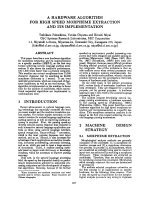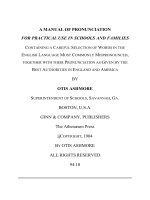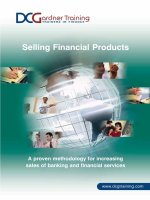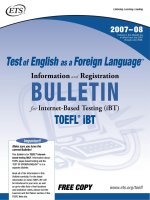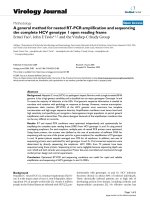Employability b1. Employment after graduation is always a serious subject for students, their families, schools, and society
Bạn đang xem bản rút gọn của tài liệu. Xem và tải ngay bản đầy đủ của tài liệu tại đây (55.12 KB, 7 trang )
I. Task 1: 750w
Employment after graduation is always a serious subject for students,
their families, schools, and society. A career in the instructional profession is
usually a goal for graduates and students currently running in university
lecture rooms. This research examines graduate employment and presents
pertinent ideas and skills determining employability after graduation.
Simultaneously, the article provides an individual viewpoint on the labour
market of human resource management students, as well as the restrictions
that each student must overcome to satisfy employers' expectations.
Because the subject has drawn academics from several fields, including
management, human resource management, accounting, career studies, and
vocational and organizational psychology, there is no worldwide agreement
on graduate employability (Mwita, 2018). Graduate employability, according
to (Holmes, 2016), is a set of knowledge, skills, abilities, behaviours, and
characteristics that make graduates more likely to get initial work
opportunities and be successful in their chosen career paths, ultimately
uplifting them as critical and reflective life-long learners who are flexible and
adaptable throughout their career span, to the benefit of themselves, their
companies, the society, and the wider economy. Employability encompasses
more than academic information (discipline-specific knowledge); it also
involves the presence of talents, abilities, and behavioural characteristics
consistent with the desired job or career. Even though entry-level graduates
have adequate technical abilities relevant to their profession, they may fail to
succeed on the job owing to a lack of soft or transferrable skills (Knight,
2018).
Vietnam's labour market has been formally constituted and expanded
since 1986, and there has been significant improvement over the last 35 years.
However, constructive assistance and modifications are required to adapt to
1
the new circumstances and overcome "shocks" like the current Covid-19
epidemic. Employers have a significant and continuing role in developing the
labour market. Vietnam has numerous big corporations with tens of thousands
of workers, which has created an open job market for students majoring in
human resource management (Van, 2021). Vietnam's workforce is lowskilled, ranking 116th out of 141 nations examined and recruiting for
managerial roles is tough for up to 73% of businesses (Van, 2021). The
present challenge is the need for workers to be trained in digital, social, and
high-quality skills. Interaction between the school and the firm is critical for
assisting employees in swiftly adapting to the labour market (Burrows, 2020).
It can be observed that colleges have become more active in arranging
extracurricular activities for students, which helps students understand the
demands of companies and even get a job before graduation. Many human
resource management students who graduated from college could not find
work, so they invest time and money in learning additional skills such as
English, information technology, secretarial skills, pedagogy, or journalism in
order to have more job opportunities in the future (Van, 2021). Some students
have found work after suffering for a few months, but most of them cannot
find work in their area of study. Because of the rise of industrial parks and
complexes, it is possible to assume that the job market for students in general,
and students of administration in particular, is quite substantial. However, to
satisfy the expectations of businesses, each student must actively improve
their skills.
The author discovers a gap between academic education and the
demands of socioeconomic realities. This warping is evident in the student's
knowledge and soft and professional abilities. Indeed, recent graduates often
must retrain for six months to a year in their workplace (Van, 2021).
Retraining includes professional competence, working attitude, professional
2
ethics, labour discipline, and fundamental abilities in dealing with and
overcoming practical production and commercial labour difficulties. The
quality of college and university education in Vietnam is constrained in many
ways, the most significant of which is that the learning material has not been
grounded in reality; it is essentially heavy on theory and light on practice. The
author also discovered that several courses in the training program were no
longer relevant to market demands.
In the context of globalization and the trend of integration, and with the
strong effect of the scientific and technological revolution, particularly the
industrial revolution 4.0, the issue of employment among young people is
becoming an important issue, with many challenges highlighted. To take on
the function of an administrator in a business, I constantly self-study
background information and soft skills that may differ from the competence I
obtained. These include problem-solving, teamwork, communication, selfmanagement, psychological, and technical abilities. These abilities will
supplement the professions learned in the university setting while bolstering
my trust in their capacity to satisfy their recruiting requirements.
<752w>
Task 2
After graduation, employment for students is one of the core human
necessities to guarantee happiness and holistic growth. Based on the criteria
given by Holmes in the theoretical background in Task 1, the author assessed
and evaluated the capacity to satisfy the demands of employers based on
characteristics such as skills, abilities, and behavioural qualities.
My classmate and I were assigned a group project last month that
required us to give a presentation on climate change. I was very excited about
3
the opportunity to make new friends and improve my teamwork skills. Our
group scheduled a meeting in a closed meeting room at a cafe near the school.
However, things did not go as planned when 5 of you arrived late without
asking for permission. Along with that, no one yielded to each other but
strove to talk loudly enough to drown out each other's voices. When selecting
a presenter and creating slides, my team was hesitant. People wanted to avoid
responsibility by preparing the material and contributing thoughts. It is clear
that the majority of my team members need to enhance their soft skills and
confidence. However, my buddies have efficiently and professionally looked
for material and produced documents. Because they were acclimated to
working online during the Covid pandemic, the online meeting the following
day was more productive than working in the meeting room. In general, we
did not work well at first, but after a time, we all knew each other better, were
more friendly, and allocated work more efficiently.
Although it has not been long, I have observed certain limits and
potential that I can improve via cooperation. I demonstrated strong
collaboration abilities when I was the one to assist my teammates in calming
and managing the work process. I displayed my problem-solving abilities by
delegating tasks to each member instead of having everyone find a solution,
which helped save time for the whole team. However, I understood I needed
to strengthen my self-management abilities after arriving late for my first
meeting with the group due to traffic. Improving my communication abilities
will also help me convey ideas more effectively.
As my objective is to become a recruitment specialist, I am motivated
to acquire skills that I believe are necessary to satisfy employment criteria,
such as problem-solving abilities, teamwork, communication abilities, and
self-management abilities. The acquisition of information makes me more
confident in my abilities. Knowledge, in particular, may assist uncover
4
numerous proper answers to issues and manage them entirely and effectively
(Obholzer, 2020). Learning from others is also an excellent technique for
developing problem-solving abilities. Students should enhance their schoolbased knowledge with soft skills in order to quickly integrate and adjust to a
new working environment (Nam, 2022). Therefore, even as a university
student, I often engage in social and professional events to enhance
fundamental skills such as communication, presentation, and specific soft
skills. To strengthen my collaborative abilities, I learnt how to use Mindmaps
and create scenarios involving management challenges, which I practised
daily. Mind mapping is a technique for evaluating and synthesizing
difficulties using visuals and colours so that people can easily comprehend the
issues mentioned (Metivier, 2022). Diagrams save time, improve memory,
promote creativity, solve issues, and produce ideas. Every night, I often
generate the chance to train regularly by simulating circumstances to improve
processing capacity. As a consequence, I can cope with unanticipated issues
with confidence. I always create respect for instructors by studying seriously,
being honest on exams, and actively engaging in school events. These are the
essential characteristics that are critical for me to become a good worker with
a professional, honest, dynamic, and creative working style, to respect the
law, and to be responsible for society in the future. Knowledge, computer
skills, and communication skills in other languages are crucial in this era of
information technology development and worldwide integration (McMahon,
2021). This is an effective and necessary tool for students to access scientific
and technological breakthroughs and widen their perspectives on the globe.
As a result, I constantly endeavour to enhance my foreign language abilities,
which allows me to work and study in an international setting.
In conclusion, most students' ideal employment is to work in the
instruction profession, but there are still many issues to overcome to fulfil
5
employers' expectations. Working in groups in online and offline workshops
has helped me identify my strengths and flaws. In the future, I want to
improve my collaboration and problem-solving abilities to satisfy the
requirements of a recruitment specialist.
<750w>
6
References
Burrows, S. (2020) The effects moderates the relationship between capital structure and
firm value. Journal of critical reviews. 7 (13), .
Holmes, L. (2016) Graduate employability: Future directions and debate. Graduate
Employability in Context. pp. 359–369.
Knight, R. (2018) Norwegian students who lack sufficient knowledge and skills to succeed
in higher education, by field of study.
McMahon, R. (2021) Applied improvisation techniques to enhance it majors' soft skills,
communication skills, and teamwork skills. Proceedings of the 22st Annual
Conference on Information Technology Education.
Metivier, A. (2022) What is mind mapping? the ultimate guide to using this powerful tool.
Available from: />[Accessed 25 October 2022].
Mwita, K.M. (2018) Tanzania graduate employability: Perception of Human Resource
Management Practitioners. International Journal of Human Resource Studies. 8 (2),
pp. 263.
Nam, L. (2022) Research the necessary code of conduct of Vietnamese students to
integrate with the working and studying environment in Japan. Quality - Access to
Success. 23 (186), .
Obholzer, A. (2020) Practical issues affecting meetings. Workplace Intelligence. pp. 110–
110.
Van, N. (2021) Vietnam has 5,600 new digital technology firms in 2021: Business:
Vietnam+ (vietnamplus). Available from: [Accessed 25 October
2022].
7

